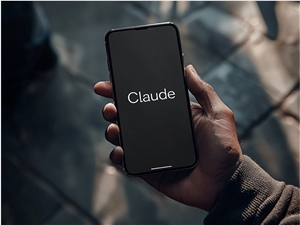On an exhilarating evening, Oprah Winfrey presented a special program on artificial intelligence (AI), titled "AI and Our Future." This event attracted a number of high-profile guests, including Sam Altman, CEO of OpenAI, tech influencer Marques Brownlee, and FBI Director Christopher Wray. The tone of the entire program was quite cautious, as if everyone was quietly beating a drum.
Oprah began by pointing out that AI's "devil" has been unleashed from the bottle, which could mean either good or bad. She reminded everyone that humans must learn to coexist with this technology. "AI has gone beyond our control, and our understanding of it is relatively limited, but it has arrived among us, and we need to consider whether it is an ally or an adversary... We are the most adaptable creatures on this planet, and we will adapt again. But we must remain vigilant to reality, as the risks are no joke," she said.

Image source note: The image was generated by AI, provided by the image authorization service Midjourney
As the first guest to be interviewed, Altman confidently claimed that today's AI can understand concepts within its training data. "We show the system a thousand words and ask it what will happen next," he said. "The system learns through prediction, thereby understanding its inherent concepts." However, many experts are not convinced.
AI systems like ChatGPT do predict the most likely next word in a sentence, but they are essentially statistical machines without genuine intent, making educated guesses based on data patterns.
Although Altman may have exaggerated the capabilities of current AI systems, he emphasized the importance of safety testing these systems. "We need to get governments thinking about how to safety-test these systems, just as we do with airplanes or new drugs," he revealed, adding that he almost daily communicates with government officials.
Altman's call for regulation may be self-serving, as OpenAI opposed California's AI safety bill SB1047, claiming it would "stifle innovation." However, former OpenAI employees and AI experts like Geoffrey Hinton support the bill, believing it will impose necessary safety measures on AI development.
In another part of the show, Oprah asked Altman why people should trust him. Altman dodged the question, stating their goal is to build trust gradually. Previously, he had explicitly stated that people should not trust him or any single individual to ensure AI benefits humanity.
The discussion then shifted to deepfakes. Brownlee demonstrated the realism of synthetic media by comparing OpenAI's AI video generator Sora with earlier AI-generated images. The results showed Sora's samples to be quite impressive, highlighting the rapid progress in this field. "Although you can still spot flaws now," Brownlee said, Oprah felt it looked very realistic.
This led to a conversation with FBI Director Wray, who recalled his first encounter with AI deepfake technology. "I was in a meeting room, and my FBI colleagues showed me how to create AI-enhanced deepfakes," Wray recounted. "They made a video of me saying things I never said." He pointed out that AI-assisted blackmail is surging, with cases increasing by 178% between 2022 and 2023.
Wray described the process of this blackmail, starting with impersonating peers to lure teenagers, then using AI-generated images to exert pressure. He said, "In reality, it's some guy sitting in Nigeria, and once he gets a real photo, he uses it for threats."
He also mentioned the issue of disinformation in the upcoming US presidential election, stressing that while there is no need for panic, "every American" should be vigilant and aware that "bad actors" might use AI to attack us.
Oprah then had a lively discussion with Microsoft founder Bill Gates, who expressed optimism about AI's prospects in education and healthcare. He envisioned AI as a third party in medical appointments, responsible for recording and suggesting prescriptions, allowing doctors to interact more with patients rather than facing computer screens.
However, Gates seemed to overlook the potential for bias due to improper training. A recent study showed that voice recognition systems of major tech companies misrecognize audio from black speakers twice as often as from white speakers. Another study revealed that AI systems could reinforce longstanding false beliefs, such as biological differences between blacks and whites, which could lead to misdiagnoses by doctors.
In education, Gates believes AI can provide "always available" learning experiences, understanding how to motivate students. However, not all schools are enthusiastic about this.
Last summer, many schools hastily banned ChatGPT due to concerns about plagiarism and misinformation, although some later reinstated its use. Many still doubt AI's potential. Surveys show that more than half of children reported seeing peers use AI in harmful ways, such as creating credible fake information or images to hurt others.
The UNESCO called on governments last year to regulate AI's use in education, including implementing age restrictions and data protection measures for users.
Through this deep dialogue with AI, audiences gained a clearer understanding of the rapid technological advancement and its potential risks, sparking profound reflections on humanity's future with AI.










